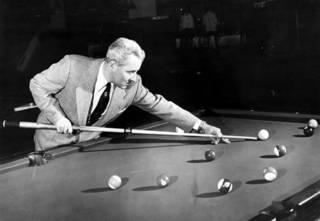Willie Mosconi and Firmant Arthur Franke: Historic Figures and Section 2(e)(4)
I've heard of Willie Mosconi, the master pool player. But Firmant Arthur Franke? Didn't he kidnap the Lindbergh baby? I can barely find him in a GOOGLE (brand) search. All of which makes me think that the TTAB got it right in two recent "surname" decisions.

In considering whether a mark is primarily merely a surname under Section 2(e)(4) of the Trademark Act, the Board considers four principal factors: (1) Is the word a common or rarely used surname? (2) Does anyone connected with the applicant have that surname? (3) Does the word have meaning other than as a surname? (4) Does the word look and sound like a surname? If the Examining Attorney establishes a prima facie case, the burden shifts to the applicant to show that the primary significance of the mark is something other than that of a surname.
In two recent cases, applicants attempted to overcome the PTO's prima facie showing by proving that the surname in question will be viewed by the relevant public as referring to a particular historic figure, and thus would not be viewed primarily merely as a surname. One applicant succeeded, one failed.
In In re Indian Indus., Inc., S.N. 76481665 (Sept. 22, 2004) [not citable], the Board found the mark MOSCONI for billiard equipment not to be primarily merely a surname. The applicant found itself behind the proverbial 8-ball when the Examining Attorney established that the word "Mosconi" looks and sounds like a surname, that individuals connected with Applicant have this surname, and that “the ordinary meaning of the term MOSCONI is merely as a surname.” But the PTO's evidence was outweighed by Indian's proof of the "strong association between the involved goods and the late Willie Mosconi," a figure of historical significance in the field of billiards whose name is “synonymous with the game.” The Board found this case analogous to In re Pyro-Spectaculars, Inc., 63 USPQ2d 2022 (TTAB 2002), in which the mark SOUSA was deemed registrable for fireworks and entertainment services "because potential purchasers would associate patriotic events with an historic figure well known in our history for his patriotic music."
Curiously, Indian's survey evidence showed that "at least 21%" of the relevant purchasing public associated Mosconi with the game of pool. Doesn't that raise the following question? -- what percentage of the survey respondents thought MOSCONI was merely a surname, and never heard of Willie Mosconi? What if that figure was more than 21%?
In the second case, In re Gibson Piano Ventures, Inc., S.N. 76411174 (Sept. 22, 2004) [not citable], the applicant's "historic figure" approach hit a sour note: the Board affirmed a surname refusal of the mark FRANKE for pianos. The PowerFinder database includes 3,564 residential listings for the surname FRANKE, and the Examining Attorney submitted the results of a search that retrieved 14,675 articles containing references to persons named FRANKE. Negative dictionary evidence also supported the refusal (i.e., there appears to be no other meaning for the word "franke," other than its surname meaning). Gibson contended that purchasers would perceive the mark as referring to “Firmant Arthur Franke,” an allegedly famous Polish piano maker. However, Gibson provided no evidence to support that contention, and the Board therefore found this case to be readily distinguishable from those involving the names of famous historical personages like SOUSA, M.C. ESCHER, and DA VINCI.
Too bad the Gibson decision is not citable. Were it citable, Firmant Arthur Franke may have finally achieved some measure of the fame that apparently has escaped him to date.




0 Comments:
Post a Comment
<< Home